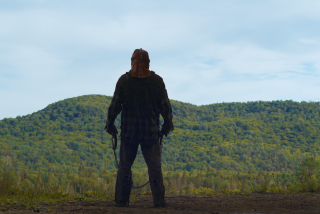Review: Joaquin Phoenix descends into a hellish New York underworld in the haunting ‘You Were Never Really Here’
Seven years ago, the gifted Scottish writer-director Lynne Ramsay made a bleak and unsettling domestic horror film titled “We Need to Talk About Kevin.” Her latest feature, her fourth in nearly two decades, is a hypnotically grim New York crime thriller called “You Were Never Really Here.”
Both movies are named after preexisting source material, which makes it a sly coincidence that Ramsay has now directed two consecutive movies that confront the viewer with strong, declarative statements. The directness of those titles feels true to the arresting quality of Ramsay’s cinema but also somewhat at odds with the feverish elusiveness of her methods. She has a great deal to say and a hundred artfully oblique ways to say it.
At first glance, “You Were Never Really Here,” adapted by Ramsay from Jonathan Ames’ tough-minded 2013 novella, would appear to be a lean, well-crafted exercise in art-house pulp. The movie runs a sleek 89 minutes — roughly speaking, about a page per minute of screen time — and it feels as brutally stripped down as its anti-hero, a gloomy thug-for-hire named Joe, played by Joaquin Phoenix in what might be the most rivetingly contained performance of his career.
But there is more to admire here than a simple economy of form and content, and the spareness of Ramsay’s approach is no mere approximation of Ames’ hard-boiled prose. The texture is as gritty as the filmmaking is exquisite. The hard shimmer of Thomas Townend’s camerawork, the sudden convulsions of Joe Bini’s editing and the juddering intensity of Jonny Greenwood’s score (another gift from the Oscar-nominated composer of “Phantom Thread”) conspire to produce their own strange, angular poetry.
As for Phoenix, you cannot help but marvel at his ability to express so much while appearing to do so little. His Joe is a quiet, withdrawn, emptied-out husk of a man, with a scraggly gray beard, scars on his upper body and a talent for hurting people. He came by that talent, in part, through his past experience as an FBI agent and a Marine serving in the Gulf War. Mostly, though, it’s rooted in the horrific abuse he suffered at the hands of his late father, as we see in jolting flashbacks that Ramsay deploys with shivery skill.
Each memory is a jagged, explosive little reminder of Joe’s past, forever bearing down on his present.
In the hands of a less assured filmmaker, this conceit might have come across as little more than connect-the-dots psychologizing. But Ramsay, a master of elliptical film language, gives the flashbacks an intensely visceral power. Their function is always expressive, never expository; each memory is a jagged, explosive little reminder of Joe’s past, forever bearing down on his present.
Now living in Queens with his aging mother (a fine Judith Roberts), whom he treats with prickly but undisguised affection, Joe channels all this psychic pain into the only job he can still do. He rescues children from sex slavery, working discreetly through a middleman (“The Wire’s” John Doman) for private clients — mostly desperate parents who want to get their children back safely and quickly, and to inflict maximum possible suffering on the perpetrators.
Joe’s latest assignment is a high-profile but seemingly straightforward job that goes disastrously awry. His client is a New York senator (Alex Manette) whose teenage daughter, Nina (Ekaterina Samsonov), has been kidnapped and, according to an anonymous tip, forced to work in a Manhattan brothel. Joe’s mission thus becomes the latest translation of the sacred sociopathic-cinema urtext that is “Taxi Driver,” and what it lacks in originality, it makes up for in craft, commitment and brooding intensity.
Armed with his weapon of choice, a ball-peen hammer, Joe gets the job done with a swiftness and efficiency that find an echo in Ramsay’s filmmaking. The action is brutal and unsparing but strikingly devoid of sadism; more than once, the movie skips the gory details and cuts to the aftermath, as if to emphasize the finality of all this killing. In the story’s boldest stroke of gallows humor, Joe and a fallen adversary croon softly together to a song on the radio, two souls improbably united by the strange, terrible intimacy of professional murder.
Joaquin Phoenix and Lynne Ramsay follow their instincts to find ‘You Were Never Really Here’ »
This is hardly the first time Phoenix has played a troubled man prowling around society’s margins, as he did so memorably in Paul Thomas Anderson’s “The Master” and James Gray’s “Two Lovers.” But his aesthetic kinship with Ramsay feels unique; she seems to perceive him in a way that few other filmmakers have. (“You Were Never Really Here” won two prizes at last year’s Cannes Film Festival, for Phoenix’s performance and Ramsay’s screenplay.) Whether the camera is tracking Joe down a dark alley or framing him underwater in a tableau of ghostly, frozen-in-time beauty, nearly every shot takes on the disquieting quality of a psychic X-ray.
Some narrative details have been altered from the book, but the plot is largely beside the point. The settling of scores and the unraveling of a far-reaching political conspiracy do not interest Ramsay so much as the eerie interplay of agony and resilience in Joe’s face, the crucible of suffering he endures and the slow, steady psychological reversal that transpires over the course of his hellish journey.
When we first meet Joe, he is broken and suicidal, a condition the film underscores with a series of tight, destabilizing closeups, as if the camera were afraid to let him out of its sight. By the end, the frame has expanded, taking in the rooms and hallways through which Joe has come and gone, a swift and invisible angel of death. It may be true that he was never really here, but as this hypnotic, hard-to-shake movie reminds us, in the end we’re all just passing through.
------------
‘You Were Never Really Here’
Rating: R, for strong violence, disturbing and grisly images, language and brief nudity
Running time: 1 hour, 29 minutes
Playing: Arclight Cinemas, Hollywood
More to Read
Only good movies
Get the Indie Focus newsletter, Mark Olsen's weekly guide to the world of cinema.
You may occasionally receive promotional content from the Los Angeles Times.











